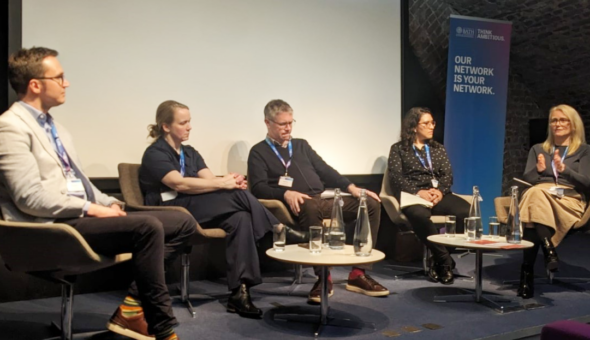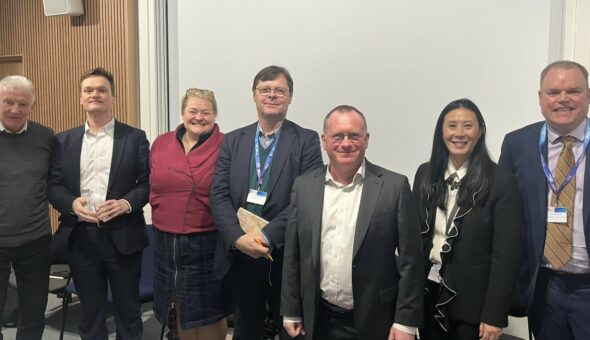Contrary to popular belief, universities – and their staff – do not shut down over the long summer break. While campus is filled with visitors attending summer schools and courses, our academics are doing the conference rounds. In this piece, CBOS Acting Director Johanne Grosvold gives a bit more insight into the academic summer.
When I meet people outside academia, they often say, “how lovely, those long summer holidays!” – the assumption being that I only work during term time, when the students are in. I then try to explain that during university holidays is when I do much of my research and go to conferences. This information is often greeted with a glazed look by the audience, and a swift change of subject, fearing as they do that if we don’t get onto the weather/cricket/road works on the B387508, I will be expecting them to have opinions on the relative merits of variance inflation factors, endogeneity and open access. So, tales of single file traffic ensues. In this blog, I thought I’d give a little insight into the academic summer, and in particular academic conferences.
Once the summer exams are behind us, student marks have been agreed and semester is over, conference season ensues. Conferences are a vital part of academic life. When I was a PhD student, presenting my work to other academics at conferences was an important way to validate my research, improve my thinking, meet people and put my name out there. Many PhD students get their first job through contacts and meetings they have at conferences. Once faculty, conferences become a way to not only present our work, and learn of others’ but also a way to find co-authors, get involved in reviewing and in academic service and help PhD students and scholars new to our field get on board.
The biggest and one of the most prestigious conferences in our field is the Academy of Management Annual Meeting, held every year in North America. The conference regularly attracts over 10,000 attendees. This year, the conference was held in Boston in August, however the AOM experience started in January, when the deadline for submitting a paper to the conference came upon us. I know the submission deadline for AOM is early January every single year. Yet every single January, I am astounded that time has come, and I usually spend a frantic few days finalising the conference submissions. This year was no different. Thankfully, since the AOM is a North American conference, I was able to play the time difference game, and got my submission in on time. US time.
Once you have submitted your paper, the waiting starts. All papers submitted to the conference are sent out for evaluations. What this means, is that three other people in your field receive an anonymised version of your submission and set about critiquing your work. If, once the critiques are in, the editor still thinks your work has some merit, you get an acceptance. This year, CBOS had a total of 14 papers accepted, seven professional development workshops and four symposia, reflecting the breadth, depth and strength of the research centre.
Fast forward to August and I was on a flight to Boston. Having negotiated an intricate combination of national express buses and trains to get to Heathrow, I found my seat on the flight, settled in and pulled out my laptop. A seven-hour flight without interruptions is gold for getting work done, which requires concentration. Thankfully the person next to me had no desire to hold a conversation, and so I was able to work through the 100 pages of work I was asked to respond to, without wrecking my brain for polite ways to close off the conversation before it had really started (Many academics, myself included, are on the introvert side of the spectrum, the irony of us going to a conference with over 10,000 participants for days is not lost on me…)
Packed and ready for #aom2019! Looking forward to excellent research and @aom_sim people. Grateful to to be going with so many colleagues from @BathSofM and @BathCBOS. See you @heathrow @ethicscrane! #thinkambitious #research4good #cbos pic.twitter.com/o3jab3ZWhp
— Dr. Johanne Grosvold (@jlg27) August 7, 2019
Once in Boston, a whirlwind of meetings, presentations, professional development workshops, symposium, receptions and dinners ensued, once I had successfully escaped Logan airport, which required some tenacity. There is a particular energy and buzz around these conferences, and the AOM perhaps more so because of its scale and scope. There are literally hundreds of sessions you can go to every day, so identifying the ones most salient to my work, and with the people whose work I am interested in, required some planning. Across all the sessions I was fortunate enough to attend, I saw great engagement, strong ideas and a real commitment to a research agenda around corporate board diversity and accountability, CSR, political activism and social entrepreneurship.
It was also hugely gratifying to see CBOS’ and the School of Management’s research presented across so many venues and domains, and to see our collective commitment to Research4Good trending on Twitter during the conference. Andy Crane and Sarah Glozer were also involved in running a professional development workshop on the way in which social media can be used to promote research on responsible business, and we’ll be sharing insights from this session later in the Autumn. CBOS member Dr. Vivek Soundararajan and his co-authors Laura Spence and Chris Rees also won the prestigious Best Paper Award from the Business & Society journal for their paper Small Business and Social Irresponsibility in Developing Countries: Working Conditions and “Evasion” Institutional work. Going to the conference also resulted in commitments from leading professors in our field to visit us, with our first visit confirmed for January 2020.
Our @BathSofM @AOMConnect in stats! What a brilliant conference for our School of Management academics. #research4good #thinkambitious #aom2019 pic.twitter.com/cO8oumfoWf
— Amanda Willmott (@amanda_willmott) August 13, 2019
My note book (yes, an actual note book, complete with a pen) was bursting at the seams by the time my conference badge came off, and I crawled sloth like into my seat to fly back to the UK. AoM is an intense experience, but there’s no denying the value that comes from meeting and connecting with colleagues for this annual celebration of research. But there were some hard questions being asked of us at the conference and we must reflect on these as we move forwards. With the accelerated rate of environmental degradation, the carbon footprint of the conference came under scrutiny and caused some serious self-reflection amongst delegates. So a final thought as conference season draws to a close - is it time to rethink how we hold academic conferences?
I am at a conference in Boston (#AOM). My division (#AOMONE) has assembled about 450 people. To offset our carbon footprint, we would need to plant 16,000 trees for 10 years. It’s time to rethink how we hold academic conferences....@HermanAguinis
— Tima Bansal (@TimaBansal) August 12, 2019
Subscribe for regular blog updates and follow us on Twitter to hear the latest.
Header image by Sahaj Bedi on Unsplash
Respond



